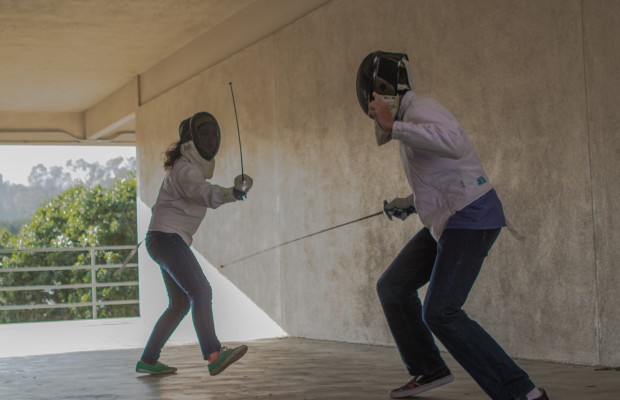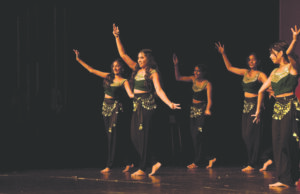Friendly Fencing

Clang!
On a sunny Tuesday afternoon, the upper halls of the B building reverberate with a sound of clashing metal like hammers in a forgery. But it’s not hammers that are making these noises; in reality, swords, wielded by members of Fencing Club, slash through the air and clash in a commotion, ending with a thunk as a the tip of one pushes its mark against the chest of a rival student.
Every Tuesday after fifth period, Fencing Club hosts mini duels on campus. The matches are refereed by the club’s members themselves, and equipment, including masks, lames, gloves, and different swords, are provided by adviser and Spanish teacher Sean Flaherty. The club is small but self-sufficient, acting as a meeting place for fencers of all levels interested in starting or improving their skills.
“I got hooked at the first practice because once I learned it, (I thought), it’s going to be amazing to know how to use a sword,” said Jason Brooks, junior, who was introduced to the club by a friend. “It’s also really, really fun. It makes me feel like a musketeer.”
“It’s very fun to get a perfect angle attack when you’re going in, and getting a really nice movement to get a point,” said Paul Schneider, senior. Schneider began fencing as a sophomore, also after being convinced by a friend.
According to Flaherty, the purpose of the club is not only to develop fencing skills such as proper footwork, wrist work, timing, and combinations, but also to teach friendly competition.
“Mostly it’s about camaraderie … and doing an activity and enjoying the friendship of that interest,” he said. “I think it’s mostly about people coming together and having friendly combat.”
Not often broadcast on television or receiving mainstream media attention, fencing has not attracted as many athletes as league sports such as football or soccer. Members of Fencing Club have various theories about why this happens.
“We think that a lot of people see it as a very nerdy sport when it’s really not,” said Schneider. “It’s a great sport to improve hand eye coordination or reflexes. So if you’re doing another sport, you can do fencing in the offseason to improve your skills.”
“I guess it’s not a big spectacle, and I think for the same reason it draws some people, it repels others,” agreed Flaherty. “You have to understand the rules and you have to know how hard it is to make (things) happen, and because that requires a bit of knowledge and a bit of training most people aren’t willing to put in the effort to enjoy it.”
Fencing Club is open to any interested students. Newcomers are trained in sword-handling and walking techniques in their first few weeks by Flaherty before they have their first bout. For many, it is both a hobby and a sport. For others, fencing offers other potentials.
“I want to be an actor when I grow up, so I think it’ll be pretty cool to put on audition forms that I can fence,” said Brooks. “Maybe (I’ll use it) in movies or something, or when I’m eighty, to keep in shape, I’ll fence.”
As to what kind of people are most suitable for fencing, Schneider replied, “Everyone, especially people who like sports that you have to think about or who want a very mental sport.”
“You don’t know how good it is until you’ve have your first bout,” said Brooks. “Then you’ll know.”



